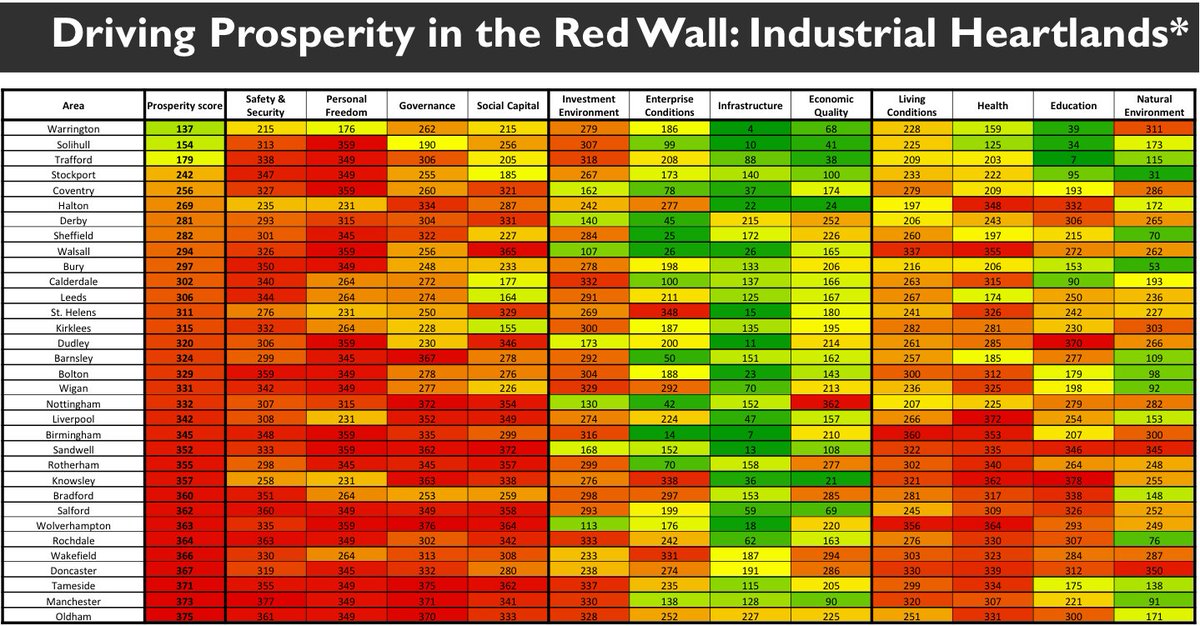
A major theme in post-Brexit Britain is @BorisJohnson 's pledge to "level-up" regions & communities that were left behind. Conservatives cannot retain power unless they deliver. @Keir_Starmer cannot return Labour to power unless he sets out credible alternative [Thread]
But it remains poorly defined & understood. What do we mean by levelling-up? How can we measure whether areas are improving or deteriorating? How can citizens, communities & councils hold gvt to account? How can policymakers identify what is working vs what is not?
We @LegatumInst have been exploring these issues for past few months & working with lots of councils, policymakers, academics & stakeholders to build the UK Prosperity Index -a tool that we think can help gvt, councils & citizens get to grips with levelling-up
I suspect like many of you we support agenda but don't think levelling-up is working v well at moment. It is too narrowly defined & detached from evidence. Is mainly focused on things like infrastructure, 'bridges & trains', sending gvt departments north and is very 'top down'
We adopt a broader definition of levelling-up. We suggest true prosperity or a 'levelled up' community is where 3 things happen
(1) ppl live in "inclusive societies" that are supported by stable families, social capital and public trust in local institutions that are effective
(1) ppl live in "inclusive societies" that are supported by stable families, social capital and public trust in local institutions that are effective
(2) ppl live in "open economies" that are supported by high quality infrastructure, strong local investment environments & enterprise conditions for businesses, effective regulations and where entrepreneurs & firms can level-up from ground up
(3) communities have "empowered people" who can take control over their own lives, have strong mental & physical well-being, effective healthcare & education systems and healthy natural environments
Organising levelling-up around these themes has allowed us to draw together a large amount of rich, reliable and open source data at the local authority level, from about 70 datasets, on nearly 400 councils across UK. It yields useful insights in about 50 policy-relevant areas
No index is ever perfect but drawing on data from 2011 onwards and then updating regularly does allow us to begin exploring how/if at all areas are changing, compare them, generate hypotheses, identify areas getting things right (& why)
We can begin to get a sense of how regions are performing across multiple areas of prosperity relative to others, identifying policy challenges that are unique to regions to inform future research. Here you can see where specific regions are struggling in specific areas 

We can zoom in to distinctive 'clusters' that share similar characteristics & policy challenges, e.g. Red Wall. 35 of 43 areas in Red Wall are in bottom half of rankings. But we can build far more nuanced pic. It has been great to be working with them to explore findings 

One interesting aspect of Red Wall is that while we mainly talking about it in terms of infrastructure that is really not its main challenge. It is really adult skills, health, finance for businesses, fraying social capital & governance
E.g. if you live in Red Wall small businesses borrow less than elsewhere, lower business start-up rates, lower venture capital, lower adult skills, much poorer health, higher crime, lots of things we talk less about. There are some exceptions which highlight best practice
If you work in policy, local government, politics, research and are interested in hearing more about the UK Prosperity Index there is a slide deck here with more information & we have a series of events throughout autumn
li.com/wp-content/upl…
li.com/wp-content/upl…
There is also a short video of some key findings here
And we would love to hear from you. We have already had some helpful suggestions on refining the Index so I will take this opportunity to give thanks for those. Here are our contact details. Best wishes, Matt 

• • •
Missing some Tweet in this thread? You can try to
force a refresh



